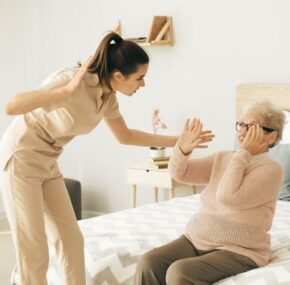Many nursing home residents suffer physical assaults by their caregivers, resulting in a variety of physical wounds, as well as emotional trauma.

(Article continues below infographic)
______
Caregiver Abuse
Elder abuse perpetrated by caregivers is common in many nursing homes and long-term care facilities. Many nursing home residents suffer physical abuse, psychological or emotional abuse, sexual abuse, financial abuse, and neglect by caregivers who are assigned to take care of them. Some caregivers willfully and deliberately inflict harm on elderly residents who are not capable of defending themselves from such abusive actions.
Incidents of emotional abuse, financial abuse, and sexual assaults often go unnoticed by family and staff members, but physical assaults that leave bruises and wounds are harder to hide. Common types of physical abuse include:
- Slapping
- Pinching
- Pushing
- Kicking
- Beating
- Rape and Sexual Assault
(Article continues below infographic)

The physical and emotional demands placed on nursing home caregivers can create high-stress levels, leading to anxiety, depression, and psychological disorders. Excessive stress may contribute to elder abuse by caregivers. Many nursing homes are understaffed due to low wages and budget concerns of facility administrators. Under-staffing, long work hours, chronic fatigue, and low wages may cause additional stress that pushes some caregivers over the edge. Alcohol and/or drug abuse by caregivers is also linked to increased incidents of physical abuse. In addition, years spent working with nursing home residents with deteriorating health, physical disabilities, and cognitive disorders may lead to a lack of compassion and empathy. Although nursing home abuse is never acceptable for any reason, certain factors may play a role.
Cases of nursing home abuse and neglect that go undetected or unreported can have significant consequences for residents. Acts of physical assault can result in serious wounds and injuries that must be promptly treated to avoid serious complications. Emotional abuse can leave residents confused and depressed, leading to loss of appetite, sleep problems, and incontinence. Physical and emotional abuse inflicted by caregivers leaves residents fearful of future attacks, leading to severe anxiety, depression, and mood changes that often contribute to declining health and premature death.
In Illinois, the State Department of Public Health oversees regulations for nursing home facilities. Each year, the department receives approximately 20,000 complaints of nursing home accidents and injuries to residents. According to state regulations, nursing homes are required to provide the highest quality of resident care possible, and facilities that fail to meet these standards are subject to fines and other enforcement actions.







